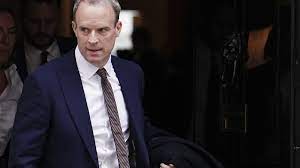Andrew Rawnsley
And another one bites the dust. Dominic Raab is the third man to exit the cabinet during Rishi Sunak’s six months at Number 10 and the umpteenth minister to be sacked or compelled to quit during the long years of Conservative government. He was the deputy prime minister. That’s a big title, his departure has generated large headlines and he’s not gone quietly into the night, banging the door behind him with a lot of uncontrite noise about being treated unfairly.
Yet his fall will probably merit only a small paragraph in the histories of these years. I say that because resignations have been so common. Bullying, sexual predation, cronyism, rule-busting, law-breaking, illicit lobbying for commercial interests. Name a genre of bad behaviour and these years have served it up. All political eras have their share of scandal. The distinguishing characteristic of this one is that there have been so many of them and of so many different types.
Cheerleaders for Mr Sunak hail the removal of Mr Raab as evidence of the prime minister’s commitment to professional standards. The opposition parties scoff at any claim that this is testimony to Mr Sunak’s upstanding character when it was he who restored Mr Raab to the role of DPM, knowing of the many accusations that he had bullied civil servants in three departments.
Point trading of this kind is to be expected at Westminster in the fallout from a cabinet resignation, but what of the public? Beyond the advantage-seeking bear pit of SW1, the majority of voters will be neither shaken nor stirred by the news that another minister, even a very senior one, has been defenestrated. That’s because there is a profound public cynicism about politics that should worry all of its practitioners.
Meanwhile, north of the border, the coils of scandal are tightening around Scotland’s governing party. The family home of Nicola Sturgeon was raided earlier this month and Peter Murrell, her husband and the party’s former chief executive, interrogated by detectives investigating allegations of financial chicanery. The police have since seized a luxury motorhome from the drive of Mr Murrell’s elderly mother and detained for questioning the party’s treasurer, who resigned from the role the following day. The new leader, Humza Yousaf, floundered when asked whether the SNP is currently a criminal organisation. Holyrood is rife with speculation that the police will soon be asking Ms Sturgeon to assist with their inquiries. The former first minister is the only senior SNP figure named in the party’s most recent accounts who has not yet been arrested.
Labour is feasting on a banquet of embarrassment for its primary opponents on both sides of the border. Sir Keir Starmer can deploy the same attack line on the Tories and the SNP, depicting both of them as decadent parties presiding over exhausted and failed governments that have been in power for far too long.
Yet Sir Keir ought to be aware – I am sure he glances at opinion polls from time to time – that a lack of public trust in his opponents does not automatically translate into faith in him and his party. If anyone thinks every minister in a Starmer government will be a paragon of virtue and entirely immune to the corrupting temptations of power, then I have a bridge and a bag of magic beans to sell you. Those who can remember Labour’s last period in office will not recall it as a communion of saints and a scandal-free zone. Labour minds should be focused not just on exploiting the vulnerabilities of their opponents. Sir Keir’s preparation for government needs to include a lot of serious thought about how he will ensure that ethical standards are higher and more rigorously enforced than we have been used to. Just saying it will be so isn’t enough.
We have a crisis of public faith in politics. This did not start with Boris Johnson, though it was certainly made worse by his debauched regime, and the crisis clearly has not been ended simply by replacing him with a different face at Number 10. The most obvious culprits are trust-smashing events that fuel justifiably fierce public outrage. Partygate and, before it, the expenses scandal did terrible damage to the reputation of politics. The disintegration of respect for Westminster is also the product of the relentless accumulation of other scandals that have made parliament look like a rogues’ gallery. An unprecedentedly high number of MPs – mainly, but not entirely Tories – have been suspended or thrown out by their parties during this parliament as a result of or pending investigations into misconduct. Daniel Greenberg, the parliamentary commissioner for standards, took up the post remarking that we are experiencing a “low point in the reputation of politics and politicians”.
There are plenty of decent people at Westminster. It is not exclusively populated by venal and self-serving villains who are in it only for themselves. But it is not hard to understand why so many of the public have become so thoroughly alienated. The Policy Institute of King’s College London has published new research into how voters view their politicians in countries around the world. The findings about the UK are bleak. Fewer than one in four of us has confidence in either the government or parliament and fewer than one in seven has confidence in the political parties. That’s a historic low. We were once a country that had a lot of reverence for its democratic institutions. We are now much less trusting of politics than many of our European neighbours. Confidence has plunged heavily among millennials. Gen Z are reaching adulthood with dismal levels of trust.
This is terrible news both for politicians and the public. When the people have so little faith in them, leaders lose the benefit of the doubt, “the most precious commodity in politics”, as Sir John Major once put it. It becomes much harder to bring the country together in any common endeavours or to build a consensus behind difficult decisions that need to be taken in the national interest.
Unaddressed, this crisis of trust is likely to prompt more of the public to give up on politics by simply disengaging from it while turning others angry and prey to the anti-democratic pied pipers of authoritarianism.
There is no magic bullet for improving trust in our politics, but there are some remedies that Westminster could implement if it had the will. A vital step is to recognise that abominable conduct by some politicians is an important driver of the crisis and we need substantial improvements to the rules governing behaviour. The guardrails have often been exposed as too feeble, while some of the watchdogs that are supposed to keep our politics clean have been toothless. David Cameron’s lobbying of ministers and officials on behalf of Greensill Capital during the pandemic was a shocker – not least because the former prime minister could seek to exploit his contacts inside government on behalf of a commercial interest and not be in breach of any of the existing rules. Confusion about the required transparency of declarations of interest apparently extends to the very top of the current government.
Rishi Sunak has been placed under investigation by the standards commissioner after failing to publicly declare that his wife owns shares in a firm that supplies childminders when a committee of senior MPs questioned the prime minister about his plans to increase incentives for childcare.
There’s so much laxity in the policing of conflicts of interest that Richard Sharp helped facilitate a personal loan for Mr Johnson and Mr Johnson put the other man forward to be chairman of the BBC and this was kept concealed from the appointments process.
Tougher rules and sterner policing has been many times recommended by a variety of expert bodies and reports. What’s been lacking is the political resolve to do it. The other thing we need is an effort to improve the calibre of those coming into politics. Parties select their candidates for parliament on the basis that they have a local support base or an influential sponsor or are in tune with the ideological fashion of the day or because they have a talent for mouthing beguiling bullshit. Much less emphasis is put on ensuring that would-be MPs are capable of acting with integrity. That needs to change. None of the parties should be complacent. All should be addressing this crisis with urgency. Our democracy is in extremely poor health when such a huge majority of people feel that they can no longer trust their government, their parties or their parliament.







